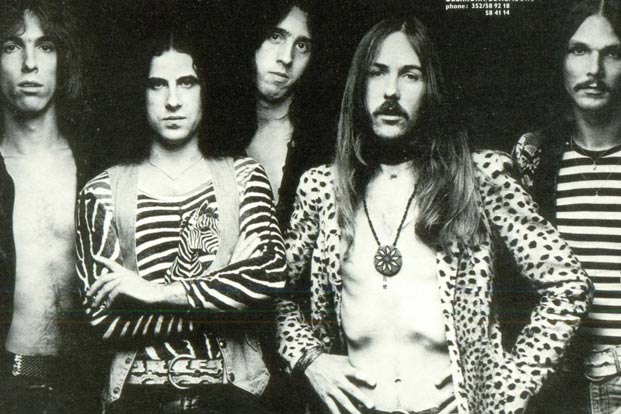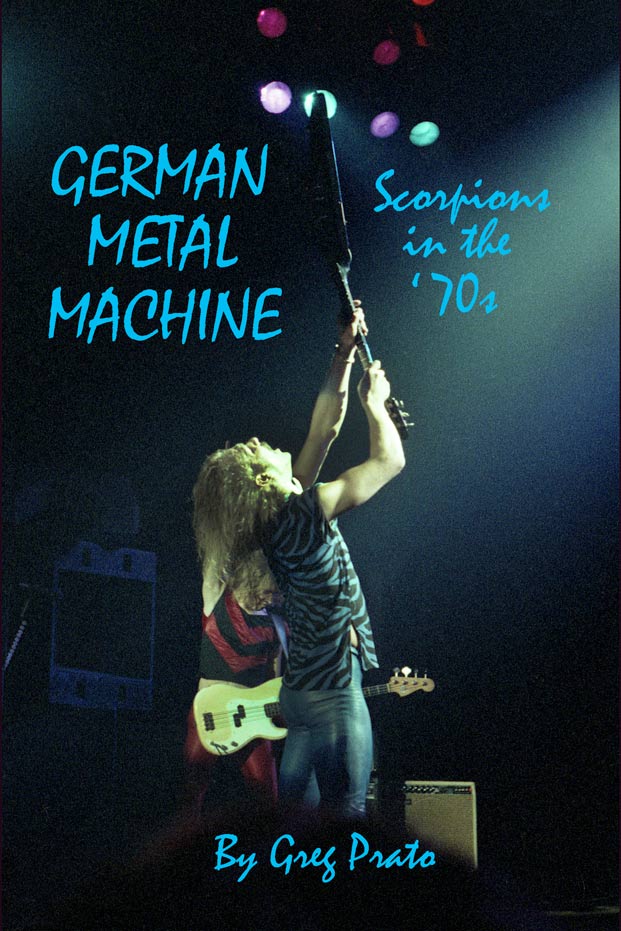Scorpions in the Seventies: New Book Dissects a 'German Metal Machine' [Excerpt]

Few rock bands were as successful as the Scorpions by the mid-Eighties—headlining arenas/stadiums worldwide, scoring two mega-selling albums (the Platinum-certified Blackout and the triple-Platinum-certified Love at First Sting) and two hit singles/videos (“No One Like You” and ‘Rock You Like a Hurricane”).
But what quite a few newcomers to the band didn't realize was that the Scorpions had been regularly recording music since 1972, and that throughout the remainder of the decade, featured two guitarists (Michael Schenker and Uli Jon Roth) at separate points that are considered legendary among the heavy metal masses.
And while such albums as Lonesome Crow, Fly to the Rainbow, In Trance, Virgin Killer, Taken by Force, Tokyo Tapes and Lovedrive did not come close to obtaining the commercial success of the aforementioned Eighties-era efforts, they inspired and influenced countless renowned musicians.
German Metal Machine: Scorpions in the '70s by Greg Prato is the first book to focus solely on this period of the band. Interviews include such former members as Michael Schenker, Uli Jon Roth, Francis Buchholz and Herman Rarebell, longtime Scorpions producer Dieter Dierks, plus members of other bands that are major admirers, including KK Downing (Judas Priest), Billy Corgan (Smashing Pumpkins), Joe Satriani, Tom Hamilton (Aerosmith), David Ellefson (Megadeth), Alex Skolnick (Testament) and Eddie Trunk (That Metal Show), among many others, while Kirk Hammett (Metallica) provides a foreword.
And while the Scorpions penned their share of classic tunes during the Seventies ("Speedy’s Coming," "Virgin Killer," "We’ll Burn the Sky,"), arguably the greatest composition was penned entirely by Roth, "The Sails of Charon,” off their aforementioned 1977 album, Taken by Force—a tune that has been publicly heralded by Kirk Hammett over the years, and served as a virtual blueprint for the style that Yngwie Malmsteen would eventually adopt as his own. In this exclusive excerpt from the book, you get the inside story behind "Charon” (You can purchase the paperback and Kindle download here and iBook download here.
Chapter 7: The Sails of Charon
The greatest guitar song of the entire "Scorpions/Uli era"?
KARL SANDERS [Nile singer/guitarist]: "The Sails of Charon." Holy fucking shit. Dude, I'm still working on some of those licks…and that's 30 years ago since I first heard that shit.
Get The Pick Newsletter
All the latest guitar news, interviews, lessons, reviews, deals and more, direct to your inbox!
TOM HUNTING [Exodus drummer]: I can hum every note of every guitar solo in "The Sails of Charon," and I'm a fuckin' drummer! So there's a huge impact.
HERMAN RAREBELL [Scorpions drummer (1977-1995)]: I love that song. I remember this was just about a few months after I joined the Scorpions, Uli invited me over to his apartment in Hanover, and he played me the song—the riff—and I said, "Wow. This is a killer song." One of my all-time favorites. So we rehearsed it, and for me, it felt great, because it had the influence of Led Zeppelin on it, and I am a big Led Zeppelin fan. So for me, this song was made for me. And you can hear it on the drumming. That song is probably one of the best Scorpions songs. In fact, I jammed with Uli two years ago at a festival in France—we jammed on the song. We made a long version—I think a 10-minute version of it.
FRANCIS BUCHHOLZ [Scorpions bassist (1973-1992)]: That is an Uli Roth song. I like playing it, because it's interesting to play on the bass. To me, it's an outstanding composition. I still play it - when I did a tour with Uli Roth in America a couple of years ago. Uli still plays it, and I like playing it. It's good to play, but it's nothing for the radio.
ULI JON ROTH [Scorpions guitarist (1973-1978)]: It didn't happen all in one day. I remember coming up with the intro theme first, but I don't quite remember how that riff came to me. All I know is I had a little flat in Langenhagen at that time, and it was upstairs. And one day, it just happened. I do clearly remember writing the lyrics, and also the guitar solo.
Which, at that time, I thought was a new departure—technically challenging, but also, there was musical meaning in it. But on the whole, that's what I remember. Then we recorded it again as a demo. We did a demo recording prior to the album in a little town in Westphalia, and this is where we recorded the backing track. But the guitar solo was the last thing that I did for that one. And I also played the bass on that one.
KK DOWNING [Judas Priest guitarist (1969-2011)]: From that song alone, you can see all the signs of all the qualities that Uli had, and would go on to do some fantastic stuff. It was a very unique piece. I didn't actually discover it until quite some time after—until later on, for some reason. Now when I go back and listen to it and analyze it, it sticks in my mind that Uli had great capabilities.
He must have had some professional musical schooling. I don't know if he can play the piano or whether he did from an early age, but he certainly got it from somewhere, that's for sure. Because it wasn't really around—not to my knowledge—from other guitar players. And I was listening to everyone that came along. But in the rock world, Uli was certainly the first one that came up with those elements of playing.
CHARLIE BENANTE [Anthrax drummer]: I remember first being on tour and being in the band, I would always bring out my cassettes—my mix tapes. And that song was always played in the dressing room. It's one of those songs that as a guitar player, you want to learn—you want to figure it out. And Uli Jon Roth back then I thought was way ahead of it.
HANK SHERMANN [Mercyful Fate guitarist]: I remember when 'Taken by Force' was released. The solos in "The Sails of Charon" were like, "Whoa! My goodness!" Even to this day, if you think about it, every guitar player in the world has that solo as a really high standout. And the phenomenal thing is it was performed in 1977 - with a lot of classical stuff to it. I had the pleasure of trying to challenge myself and covering that song - it took me about 30 years before I said, "OK, I'll give it a try and see how good I can perform it."
LIPS [Anvil singer/guitarist]: No one had ever heard those notes played on guitar before that point. No one. Certainly on violins and cellos and orchestration, but never on an electric guitar.
PAUL GILBERT [Mr. Big & Racer X guitarist]: That song is intimidating! Every time I hear the solo, I think, "I should really figure out that solo." But I'm scared of it - because Uli plays it so beautifully. It's got such great vibrato and the composition is amazing and his tone is amazing. He half-invented Yngwie with that solo.
And it was really different - I can't think of anybody who had that classical/Phrygian, dominant/Baroque elements to their music. I know that in Emerson, Lake & Palmer, you hear them doing some classical stuff. But it wasn't as "Bach." Their stuff was more like, Mussorgsky's "Pictures at an Exhibition." So they were sort of in the Romantic era. They did Aaron Copland's "Hoedown." But the part that the Scorpions did, I didn't hear anybody doing that kind of thing.
CHRIS CAFFERY [Savatage & Trans-Siberian Orchestra guitarist]: I'd have to say that everybody's favorite old Scorpions song as a guitar player is "The Sails of Charon." That song is the one that you heard and you were like, "What the heck is this?!" Because it was trippy, it was different. The funny thing is if you ever look at the old interviews that Yngwie Malmsteen did, he never credited Uli - until recently. He used to say, "Oh, I did not know who Uli Roth was." And it's like, "Bullshit you didn't! You stole everything you ever did from him and Blackmore!" [Laughs]
I don't think he wanted to let people know about Uli, because if you took Uli and you studied him and you played it over and over and got faster and faster, then you had Yngwie. Yngwie knew that. And that was the funny thing about that. That's where that came from. And if you read his old interviews, people even asked him, "What about Uli Roth?" "Oh, I'm not very familiar with him." It wasn't until recently that he was like, "Oh yeah, Uli, definitely."
KK DOWNING: If there's one guy that could do what Yngwie could do—before Yngwie could do it—it would have been Uli.
JOE STUMP [Solo guitarist]: It had the "evil riff" in the beginning, and then, it's a very interesting track, because the guitar solo was the first thing you hear in the track. And the first time I heard the guitar solo, I was like, "Holy shit." It reminds me of the first time I heard the early Yngwie stuff or Al Di Meola's Elegant Gypsy when I was a kid. It really grabbed me. Just his tone and his vibrato, and the amount of technique he was playing with. And plus, I was always drawn to players that used those kind of dark-sounding European tonalities.
JAMES BYRD [Solo guitarist]: That was the first time I heard anybody playing diminished arpeggios and harmonic modes in a rock context. I had been listening to Al Di Meola and figuring out his stuff, but it wasn't rock or metal. It had a powerful sound to it that was different from anything that was around. It immediately caught my ear. "The Sails of Charon" was the guitar solo that everybody had to try to learn how to play back in the day.
ALEX SKOLNICK [Testament guitarist]: There were a few songs at that time that really captured a Middle Eastern sound. The technical name of that scale is the harmonic minor scale. It was pretty new to rock, as far as I know. It snuck in a few times. Like, the Beatles song, "Girl," they snuck that in there. Then there was surf music—"Miserlou" had it. But just to hear hard rock with virtuosic guitar playing with that mode, it was a very cool thing. So, to me, "The Sails of Charon" really captured that. Ritchie Blackmore's "The Gates of Babylon" is another one.
CHRIS CAFFERY: That Middle Eastern metal—it was heavy. A soundtrack for a metal monster movie about pyramids would be that song! It had that sound. I don't think anybody had really done that. Blackmore had gotten into the stuff with "The Gates of Babylon"—he was on that edge of that. But "The Sails of Charon," that was that type of song, nobody had really done that - that "Middle Eastern metal sort of vibe" yet—until that song.
JIM MATHEOS [Fates Warning guitarist]: That's one of the ones when I listened to it, I was like, "What the hell is this guy doing?" And I remember spending hours…days trying to learn that song. I still think even right now I couldn't cop it very well.
STEVE "ZETRO" SOUZA [Exodus singer]: I started out as a guitar player before I became a vocalist, and I remember we are all at guitar class, and I was like [sings melody of the opening guitar riff of "Charon"], and we were all trying to figure it out. The whole song, the riff definitely stands out. The guitar work was up and above what usually a band is about. At that period of time, the guitar work wasn't all that in the forefront. Priest was very good at guitar work in the Seventies. I think AC/DC had great riffs, but not guitar work. Who's going to come up with a song like [again sings "Charon" riff]? Just that whole progression there, to write that and create a song that is genius and ballsy.
You're setting the bar completely on another level…again, we're not in 2015. We're in 1977, and everybody's used to "verse, chorus, verse, chorus." And here, you've got guys that are writing and arranging music that's not going with the way songs are written - the way rock songs have been written. That's why, to me, heavy metal takes everything to another level, because the changes are unlike any other type of music, whatsoever. And I think especially in "The Sails of Charon," Klaus comes in and sings [sings vocal melody], and you've created a song out of the greatest riff, and it worked. You pulled it off. That's what caught me. What was heavier than that? Who played a rhythm heavier than that at that time? Nobody. They were the heaviest band in the world.
LIPS: It's one of those songs that you listen to for the rest of your life. And you can tell right away, it was so "thick in detail guitar." You're going, "This is going to take me the rest of my life to figure out what he played here, because it's so beyond my scope of playing"—at the time. It's like, "Holy shit. It's going to take many years to decipher this."
And it has, and it still bewilders me how he found that, and how deep his inspiration was to hear those notes, to look for them, to play them. I think it's environment, early influence - those kind of things, how do you quantify that? To me, it was like a golden grail. The first time hearing that, you're going, "My God. What is that?" It's something beyond your scope and it sounds so good to your ears, you're going, "Wow!"
But I think it's more appreciated by somebody who plays, rather than somebody who is just listening to music. Somebody listening to music goes, "Oh. That's very nice." They're not realizing, "Oh my God. How did he figure that out? Where the hell did you get that order of notes from? How do you do that? And what are the spaces and the structure of those scales?" It's so beyond the blues scale. That's how it stuck me—I'd never heard those modes and notes in rock history.
BILLY CORGAN [Smashing Pumpkins singer/guitarist]: It does sort of usher in the Satriani's and the Vai's. It really is this other level of guitar playing, in a way that almost dominates the track, but doesn't kill it. And when you look at when Uli did it, he's so ahead of the curve on where guitar is going. I mean, yeah, there are great guitar players, but it's this other level of virtuosity that sort of works within the song—in a way that doesn't kill it.
Which is pretty strange, because usually up to that point, it's like guys would do "guitar showpieces," like Alvin Lee or something—"I'm Going Home." It's like a bullshit piece so the guy can take off on the guitar. Somehow, Uli elevates the song with his playing, but in a way that makes the song distinctive and still pop, which is very, very strange. And then, all those crazy modes that he's playing…that's pure Uli right there. It makes sense to him.
EDDIE TRUNK ['That Metal Show' co-host & 'Eddie Trunk Live' host]: Uli Jon Roth's guitar playing is unbelievable, and it's got that great riff. But then it's got this super melodic, incredible guitar playing through it. It's a little of everything—it's heavy, it's melodic. His solo right over that opening riff is just so great. It's not a particularly long song—it's not like it's a twelve-minute epic or whatever—but it feels that way, because it's got so many different styles to it and directions within it.
TRAVIS STEVER [Coheed and Cambria guitarist]: It's pretty fucking amazing—doing that so ahead of its time. That's the part that sticks out—they were doing things ahead of their time. They always were. Guitar-wise, especially.
Ordering Information:
You can purchase the paperback and Kindle download here, a Nook download here and iBook download here.

Greg is a contributing writer at Guitar World. He has written for other outlets over the years, and has been lucky to interview some of his favorite all-time guitarists and bassists: Tony Iommi, Ace Frehley, Adrian Belew, Andy Summers, East Bay Ray, Billy Corgan, Alex Lifeson, Geddy Lee, Les Claypool, and Mike Watt, among others (and even took lessons from John Petrucci back in the summer of ’91!). He is the author of such books as Grunge Is Dead: The Oral History of Seattle Rock Music, Shredders: The Oral History of Speed Guitar (And More) and Touched by Magic: The Tommy Bolin Story.
Industry expert and YouTuber Adam Saunders launches new books to break down the barriers of music theory to make songwriting simple
“He scoured the globe to find these guitars. I had given many away or sold them through the years, but he tracked them down”: A 1,000-page book showcasing Steve Vai’s iconic guitars has been announced – and it will be joined by a super-limited Ibanez JEM











